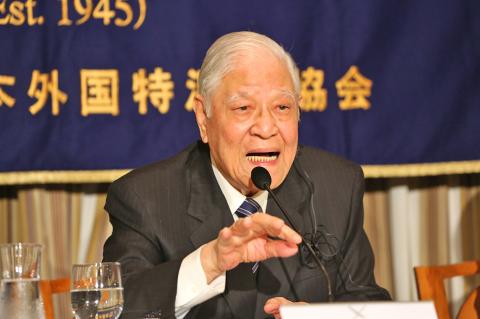Former president Lee Teng-hui (李登輝) held one-and-a-half-hour talks with with Japanese Prime Minister Shinzo Abe yesterday at a hotel near the National Diet Building, TV Tokyo Corp reported.
TV Tokyo Corp yesterday said that Abe visited Lee at the Capital Hotel Tokyu where Lee stayed, which if true, would be an unprecedented event.
The television station cited sources within the Liberal Democratic Party “with close ties to Taiwan,” and said Lee confirmed he had met Abe before he left the hotel to give a talk at the Foreign Correspondents’ Club of Japan (FCCJ) yesterday.

Photo: CNA
However, Lee Teng-hui Foundation Secretary-General Wang Yan-chun (王燕軍) later denied that Lee had met with Abe.
Wang said Abe was at the hotel to meet with someone other than Lee, Wang said, adding that further questions for details should be directed to Abe.
Responding to reporters’ questions at the FCCJ meeting, Lee said only: “I cannot say anything on having met [with Abe]. I can only say that Prime Minister Abe has contributed greatly to Japan.”
Separately, reporters from the Liberty Times (the Taipei Times’ sister newspaper), asked Lee what his thoughts were on reports that China simulated an attack on the Presidential Office Building in war games despite President Ma Ying-jeou (馬英九) administration’s China-leaning policies, and how Taiwan should pursue future relations with China.
Lee said that Taiwanese politics may see changes after the combined presidential and legislative elections on Jan. 16 next year, but that the basic line with China should be: “China is China, Taiwan is Taiwan.”
Lee added that as long as both sides could respect each other, there could be peaceful coexistence.
“We absolutely will not agree if China is pushing the ‘one China’ principle,” Lee said.
Lee strongly praised the Abe administration’s national defense bill, which would lift restrictions on Japanese troops to allow them to fight abroad for the first time since World War II, saying that the bill would contribute to peace and stability in not only Japan, but also globally.
When asked by Hong Kong reporters on his evident affection for Japan and if Taiwanese felt life was better under Japanese rule, Lee said that Japanese did not treat Taiwanese any better under its rule, but people like Japanese colonial administrator Goto Shinpei and Japanese civil engineer Yoichi Hatta had benefited Taiwan greatly.
Japan also enabled Taiwan’s rapid modernization, Lee said, adding that Taiwanese aid to Japan after the earthquake, tsunami and nuclear power plant meltdown in 2011 is symbolic of Taiwan-Japan friendship.

INVESTIGATION: The case is the latest instance of a DPP figure being implicated in an espionage network accused of allegedly leaking information to Chinese intelligence Democratic Progressive Party (DPP) member Ho Jen-chieh (何仁傑) was detained and held incommunicado yesterday on suspicion of spying for China during his tenure as assistant to then-minister of foreign affairs Joseph Wu (吳釗燮). The Taipei District Prosecutors’ Office said Ho was implicated during its investigation into alleged spying activities by former Presidential Office consultant Wu Shang-yu (吳尚雨). Prosecutors said there is reason to believe Ho breached the National Security Act (國家安全法) by leaking classified Ministry of Foreign Affairs information to Chinese intelligence. Following interrogation, prosecutors petitioned the Taipei District Court to detain Ho, citing concerns over potential collusion or tampering of evidence. The

TRADE: The premier pledged safeguards on ‘Made in Taiwan’ labeling, anti-dumping measures and stricter export controls to strengthen its position in trade talks Products labeled “made in Taiwan” must be genuinely made in Taiwan, Premier Cho Jung-tai (卓榮泰) said yesterday, vowing to enforce strict safeguards against “origin laundering” and initiate anti-dumping investigations to prevent China dumping its products in Taiwan. Cho made the remarks in a discussion session with representatives from industries in Kaohsiung. In response to the US government’s recent announcement of “reciprocal” tariffs on its trading partners, President William Lai (賴清德) and Cho last week began a series of consultations with industry leaders nationwide to gather feedback and address concerns. Taiwanese and US officials held a videoconference on Friday evening to discuss the

NEGOTIATIONS: The US response to the countermeasures and plans Taiwan presented has been positive, including boosting procurement and investment, the president said Taiwan is included in the first group for trade negotiations with the US, President William Lai (賴清德) said yesterday, as he seeks to shield Taiwanese exporters from a 32 percent tariff. In Washington, US Trade Representative Jamieson Greer said in an interview on Fox News on Thursday that he would speak to his Taiwanese and Israeli counterparts yesterday about tariffs after holding a long discussion with the Vietnamese earlier. US President Donald Trump on Wednesday postponed punishing levies on multiple trade partners, including Taiwan, for three months after trillions of US dollars were wiped off global markets. He has maintained a 10 percent

PERSONAL DATA: The implicated KMT members allegedly compiled their petitions by copying names from party lists without the consent of the people concerned Judicial authorities searched six locations yesterday and questioned six people, including one elderly Chinese Nationalist Party (KMT) member and five KMT Youth League associates, about alleged signature forgery and fraud relating to their recall efforts against two Democratic Progressive Party (DPP) legislators. After launching a probe into alleged signature forgery and related fraud in the KMT’s recall effort, prosecutors received a number of complaints, including about one petition that had 1,748 signatures of voters whose family members said they had already passed away, and also voters who said they did not approve the use of their name, Taipei Deputy Chief Prosecutor